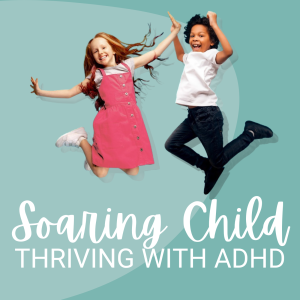
Soaring Child: Thriving with ADHD
Kids & Family:Parenting

36: To Punish or Not To Punish, That is the Question with Lori Long & Katie Severson
 2022-12-15
2022-12-15
On this week’s edition of Soaring Child, we’re joined by child psychologist Lori Long and certified speech language pathologist Katie Severson. They were instrumental in creating the Childhood Collective, designed to empower parents by teaching science-backed strategies to raise confident children with ADHD.
One approach is to look at the ABCs of behavior -- A being antecedent, B being behavior and C being consequences. The antecedent is looking at what occurs before the behavior that might trigger it. The consequence is what happens after the child engages in the behavior and how it serves them. For example, lying could be an avoidance behavior. It’s important to ask kids what’s bothering them and unpack the problem so you can solve it by changing up the antecedents.
Communication is essential in changing behavior, including asking questions like, “What’s so hard about this?” or “What emotions were you feeling when I asked you to do this?” Instead of punishing your child for a behavior, ask yourself what your child’s need is and what they are communicating to you. The goal is to teach a more desirable behavior to get those needs met.
It's also important to set up routines and really connect with your child by leaning into their interests and helping to build skills, especially their unique executive functioning skills.
Punishment will give you the quickest fix, but it doesn’t teach any new skills, so it won’t help kids in the long run. Teaching new behaviors takes time, but it can be done by using positive language, giving positive feedback, and building them up in a positive way. That’s how to make long-term changes in the brain.
Key Takeaways:
[3:35] What the Childhood Collective is and how it formed
[5:52] The ABCs of behavior
[8:45] The example of lying as an ADHD behavior
[12:08] Example of cleaning up their room
[16:22] Focusing on connection
[17:14] The role of executive functioning
[21:52] Why punishment doesn’t work in the long run
[24:20] The right dose of medication
[25:27] Dealing with homework
[27:33] Using consequences in a positive way
[33:38] Supporting kids with ADHD in school
How To Connect With Lori & Katie:
www.thechildhoodcollective.com
Instagram: @thechildhoodcollective
Facebook: @childhoodcollective
TikTok: @thechildhoodcollective
Memorable Quotes:
“They get to escape something that’s undesirable, and we try and figure that out to understand what they are trying to get and how we can give that to them in a way that's acceptable.”
“Instead of punishing your child for this thing that's maybe not going to be an effective punishment, you're looking at it and saying, what is my child's need here?”
“ADHD results in difficulty regulating attention, and when kids are focused on one thing, they're not hearing the other.”
“A punishment will actually give you the quickest fix, but it's also the shortest fix because it doesn't teach any new skills.”
“We really want parents to think about what could be going on here and how we can change the situation in the beginning and how we can set kids up for success.”
Dana Kay Resources:
Website - https://adhdthriveinstitute.com/
Facebook - https://www.facebook.com/adhdthriveinstitute
Instagram - https://www.instagram.com/adhdthriveinstitute/
YouTube - https://www.youtube.com/c/ADHDThriveInstitute
LinkedIn - https://www.linkedin.com/company/74302454/
Pinterest - https://www.pinterest.com/adhdthriveinstitute/
Tiktok - https://www.tiktok.com/@adhd_thriveinstitute
International Best Selling Book, Thriving with ADHD - https://adhdthriveinstitute.com/book/
Free Reduce ADHD Symptoms Naturally Masterclass – https://bit.ly/3GAbFQl
ADHD Parenting Course – https://info.adhdthriveinstitute.com/parentingadhd
ADHD Thrive Method 4 Kids Program - https://adhdthriveinstitute.com/packages/
More Episodes
 2022-04-18
2022-04-18
Create your
podcast in
minutes
- Full-featured podcast site
- Unlimited storage and bandwidth
- Comprehensive podcast stats
- Distribute to Apple Podcasts, Spotify, and more
- Make money with your podcast
It is Free
- Privacy Policy
- Cookie Policy
- Terms of Use
- Consent Preferences
- Copyright © 2015-2024 Podbean.com




